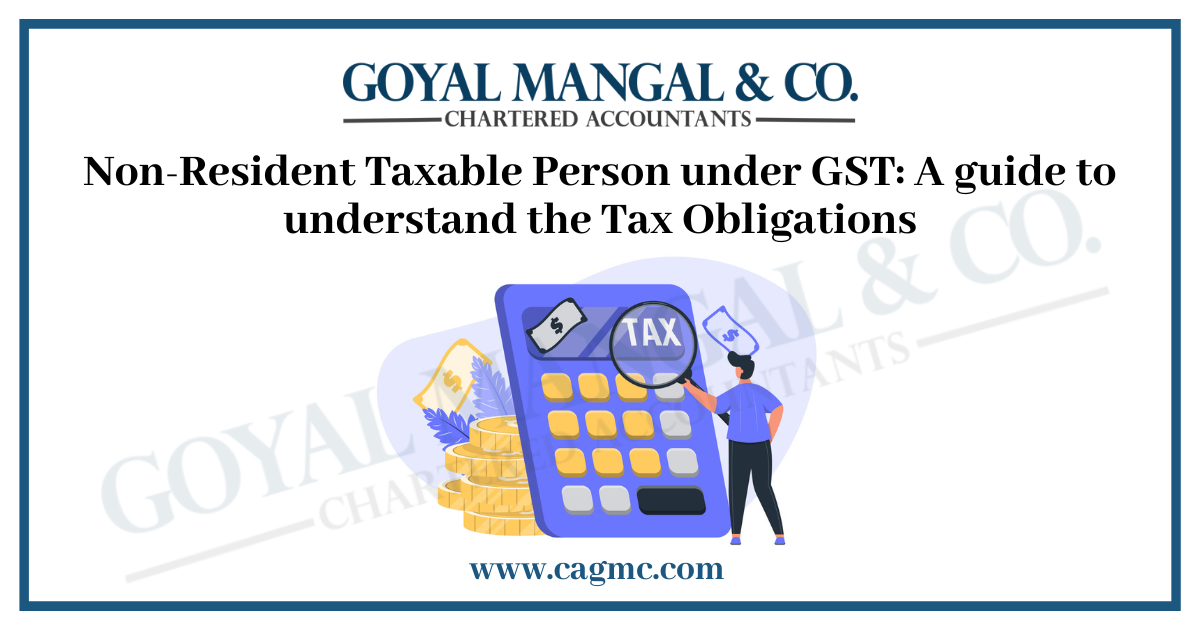
In India, the Goods and Services Tax (GST) regime has brought crucial changes in the taxation system, including provisions of Non-Resident Taxable Persons (NRTPs). NRTPs are individuals or businesses, whose place of businesses are not fixed but engage in taxable supplies of goods or services in India. This article provides a comprehensive overview of NRTP under GST. Furthermore, article will provide the legal definition of NRTP, eligibility criteria, necessary documents, registration process, and benefits.
Legal Definition of Non-Resident Taxable Person under GST
The legal definition of a Non-Resident Taxable Person (NRTP) under the GST in India is provided in Section 2(77) of the Central Goods and Services Tax Act, 2017. According to the Act, a Non-Resident Taxable Person is defined as follows:
“Non-resident taxable person” means any person who occasionally undertakes transactions involving the supply of goods or services or both, whether as principal or agent or in any other capacity, but who has no fixed place of business or residence in India.
This definition clarifies that a non resident individual (NRI) is an individual or business entity that engages in transactions related to the supply of goods or services, either as a principal, agent or in any other capacity. However, they do not have a fixed place of business or residence in India. The non-resident status distinguishes them from individuals or entities that are residents of India for tax purposes.
The GST laws and regulations provide specific provisions and requirements for NRTPs, including registration, tax payment, and return filing obligations, to ensure compliance with the tax liabilities arising from their taxable supplies in India.
Who is Non-Resident Taxable Person?
A NRTP under the GST is an individual or business entity that does not have a fixed place of business in India but is involved in taxable supplies of goods or services in the country. In simple terms, it refers to a person who is not a resident of India but conducts business activities that attract GST liability in India.
To qualify as a Non-Resident Taxable Person under GST, the following conditions must be met:
- Non-Resident: The person should not have a residence or place of business in India. They may be an individual or a business entity located outside India.
- Supply of Goods or Services: The person must be involved in making taxable supplies of goods or services in India. Taxable supplies include any supply of goods or services that attract GST liability.
- Not Registered under GST: The person should not be registered under GST in India. NRTPs are required to obtain a separate registration as a Non-Resident Taxable Person.
Eligibility Criteria for Non-Resident Taxable Person to Register under GST
The eligibility criteria for NRTP registration are as follows:
- Non-Resident Status: The person should be a non-resident of India, meaning they do not have a fixed place of business or residence in the country.
- Occasional Transactions: The person must occasionally undertake transactions involving the supply of goods or services or both. This means that the person is not engaged in regular or continuous business activities in India.
- Supply of Goods or Services: The person should be involved in taxable supplies of goods or services or both in India. Taxable supplies include any supply that attracts GST liability.
- No Place of Business in India: The person should not have a fixed place of business in India. This means they do not have a permanent establishment or physical presence, such as an office, branch, warehouse, or factory in India.
Documents required for GST Registration for Non-Resident Taxable Person
When applying for GST registration for NRTP in India, the following documents are typically required:
- Passport: A copy of the passport of the applicant, clearly showing the personal details and the validity of the passport.
- Valid Visa: A copy of the valid visa that allows the applicant to enter and stay in India to conduct business activities.
- Business Registration Proof: If the applicant is a business entity, proof of registration or incorporation documents in the home country should be provided. This may include a certificate of incorporation, partnership deed, or any other relevant document.
- Bank Account Details: Bank account details of the applicant, such as the account number and the bank branch’s address and the IFSC code.
- Authorized Signatory’s Details: If the applicant will be represented by an authorized signatory, a letter of authorization or power of attorney granting the individual the authority to act on behalf of the applicant should be provided.
- Address Proof: Proof of the address of the NRTP, such as a utility bill or a bank statement, showing the address outside India.
- Photograph: Passport-sized photographs of the applicant.
Step-by-Step procedure for Non-Resident Taxable Person to register under GST
Here is a step-by-step procedure for an NRTP to register for GST in India:
- Determine Eligibility: Ensure that you meet the eligibility criteria for NRTP registration.
- Obtain Required Documents: Gather the necessary documents for registration.
- Access the GST Portal: Visit the official GST portal, which is the online platform for GST registration and other related activities.
- Initiate Registration: Click on the “Services” tab and select “Registration” from the drop-down menu. Then, choose “New Registration” and select “Non-Resident Taxable Person (NRTP)” as the registration type.
- Fill out the Application Form: Provide the required details in the GST REG-09 application form. This includes personal information, business details, and address particulars. Attach the supporting documents in the specified format.
- Verification through Digital Signature Certificate (DSC): If you have a Digital Signature Certificate (DSC), you can sign the application electronically. This step is optional but recommended for a smoother registration process.
- Submit the Application: After filling in the form and attaching the documents, apply on the GST portal. You will receive an acknowledgement containing the Application Reference Number (ARN).
- Application Processing: The tax authorities will review your application and may seek additional information or clarification if required. The processing time can vary, but typically it takes a few working days.
- Obtain Registration Certificate: Once your application is approved, you will receive the GST registration certificate electronically. The certificate will contain your unique Goods and Services Tax Identification Number (GSTIN).
- Start Compliance: After receiving the registration certificate, you can commence your taxable supplies in India. Ensure that you adhere to the GST compliance requirements, including tax payment, return filing, and record-keeping obligations.
Advantages of Non-Resident Taxable Person Register under GST
Registering as an NRTP under the GST in India can offer several advantages for non-resident individuals or businesses. Here are some key advantages of NRTP registration:

Takeaway
Through this article, we can conclude that becoming an NRTP under GST in India comes with its own set of obligations and considerations. NRTPs play a crucial role in the Indian economy by participating in taxable supplies, even without a fixed place of business within the country. NRTPS need to navigate the registration process, fulfil their tax liabilities, and comply with GST regulations to avoid penalties or legal complications. While the concept of NRTPs may seem complex, this article has provided a comprehensive overview of the key aspects involved. By understanding the eligibility criteria, registration process, and compliance requirements, NRTPs can ensure smooth operations and compliance with the GST framework.


